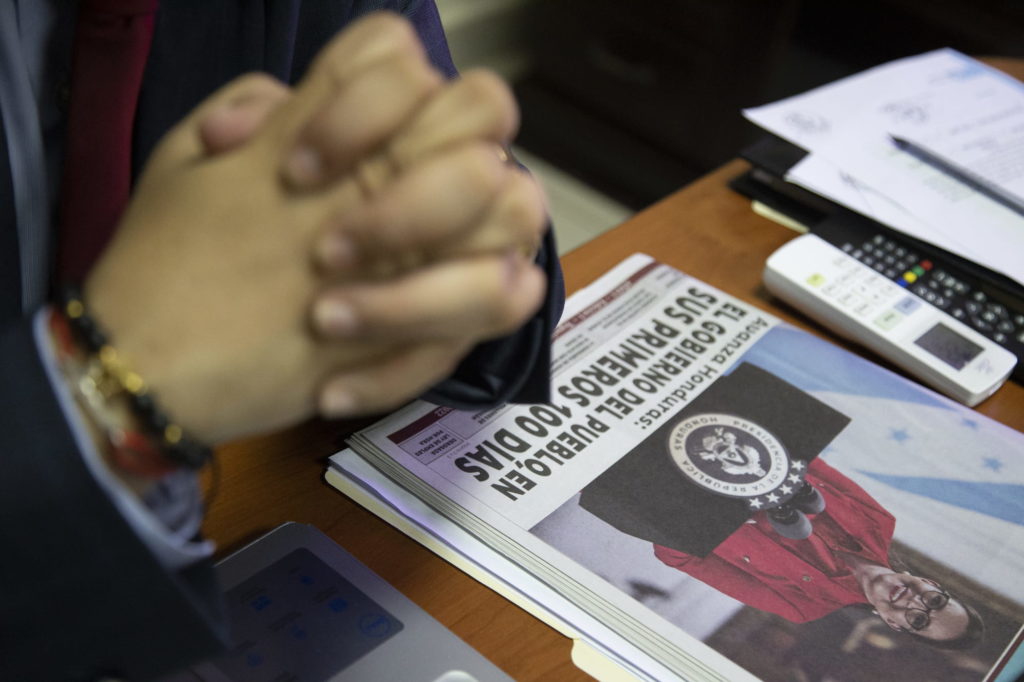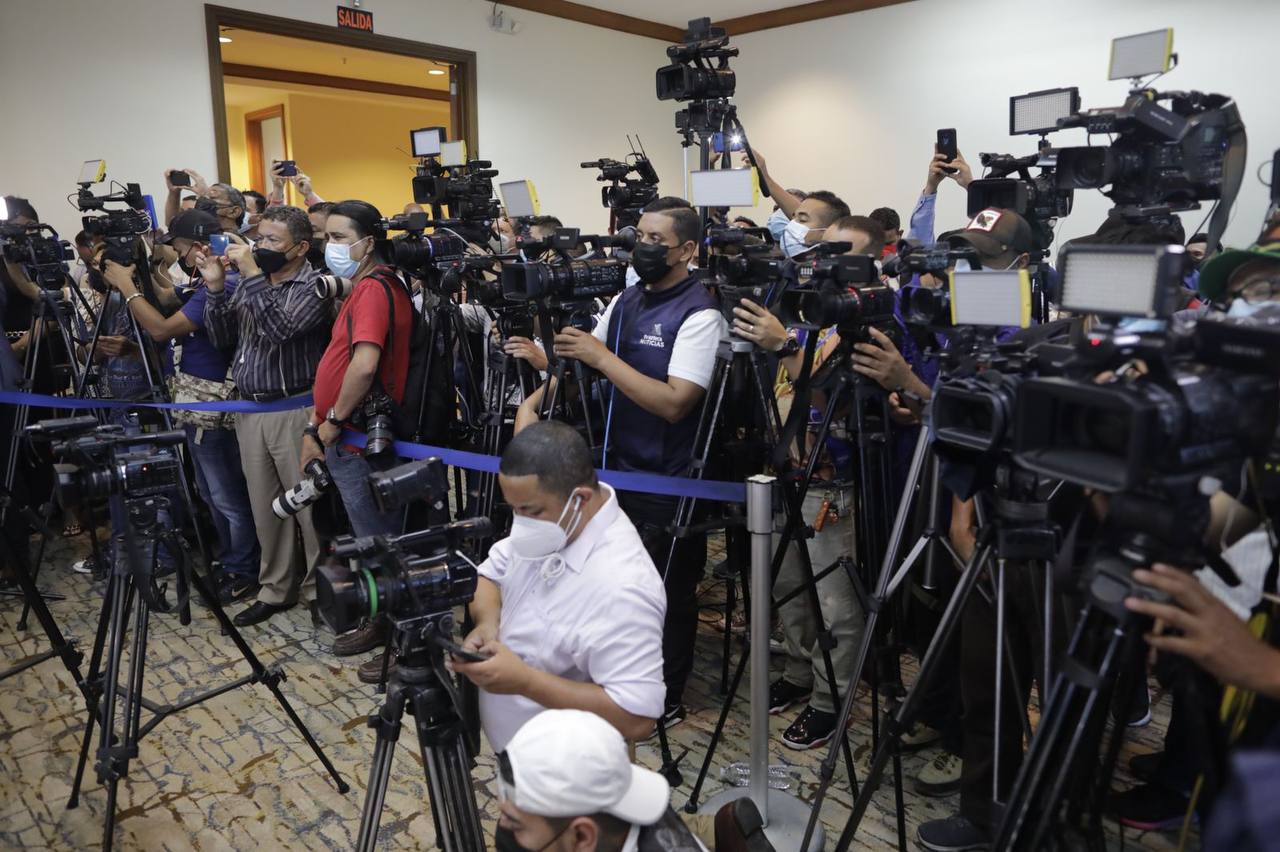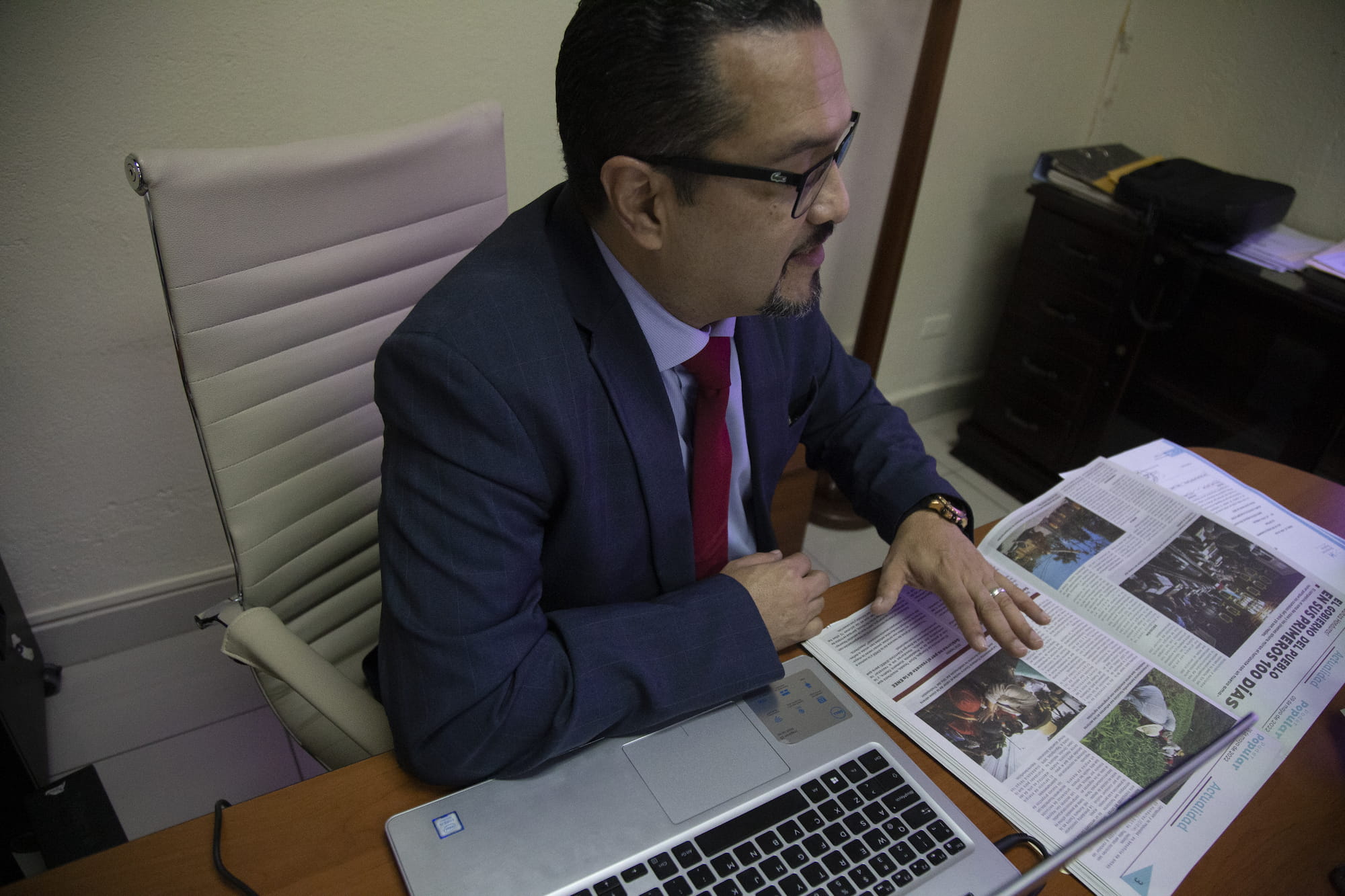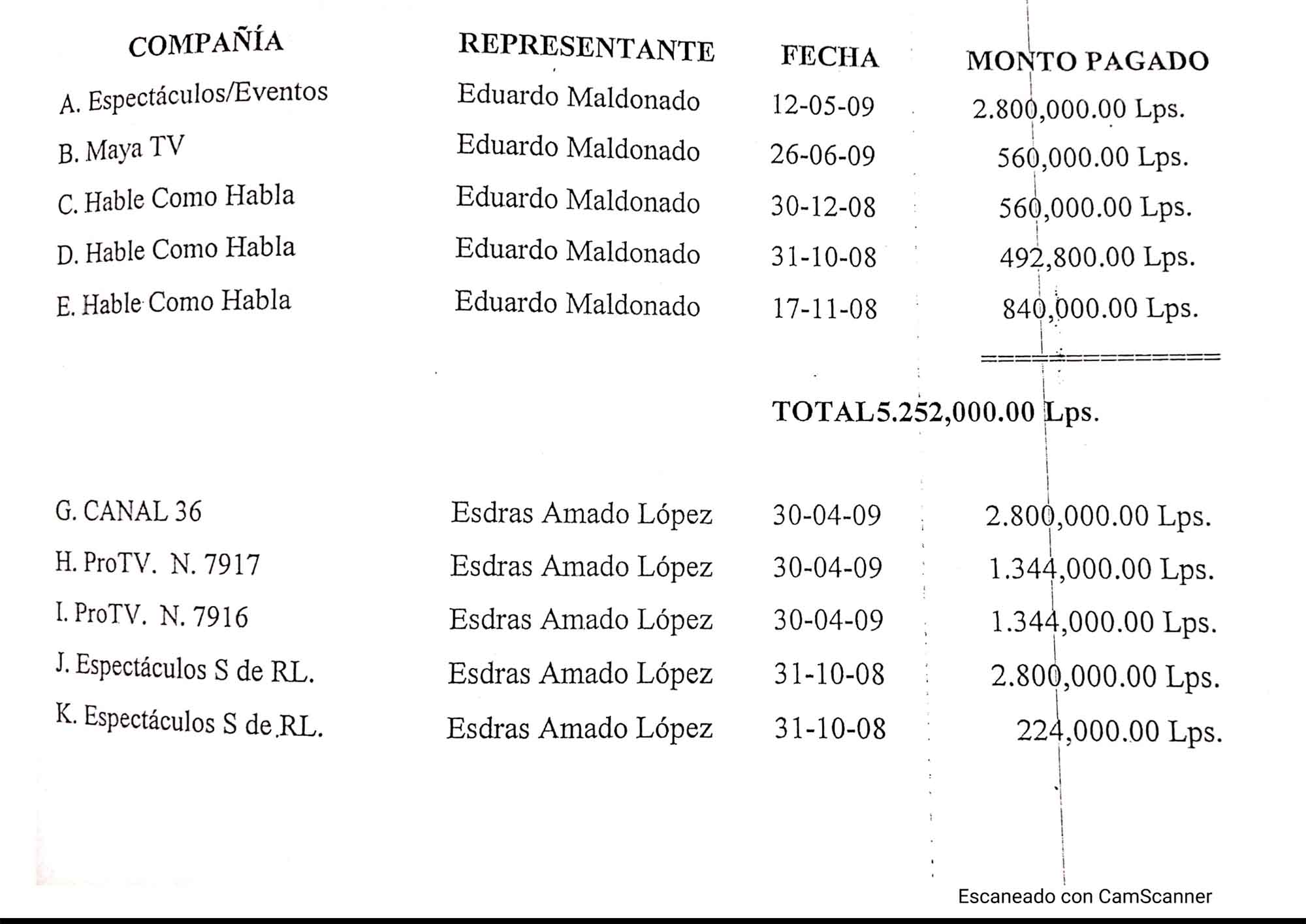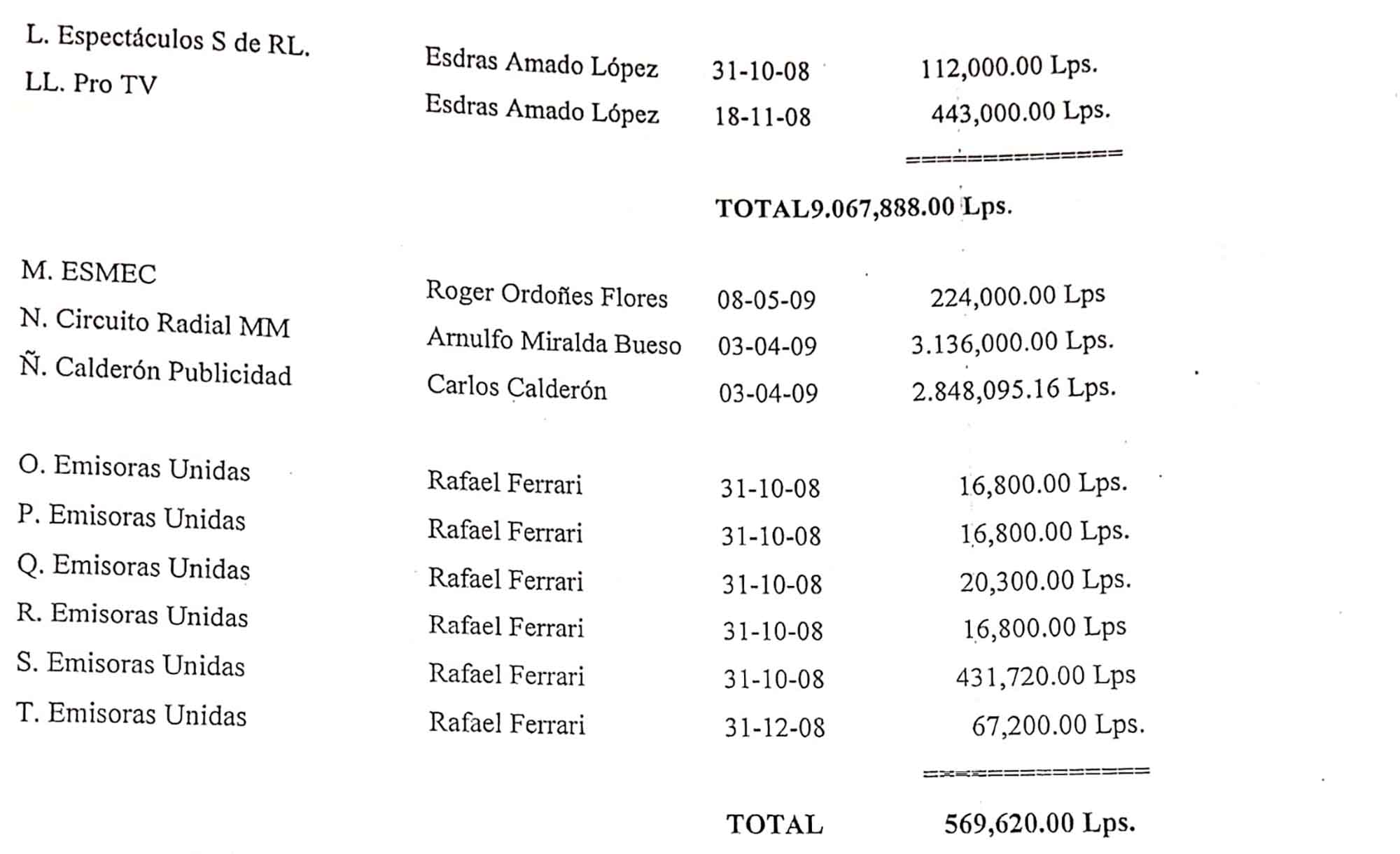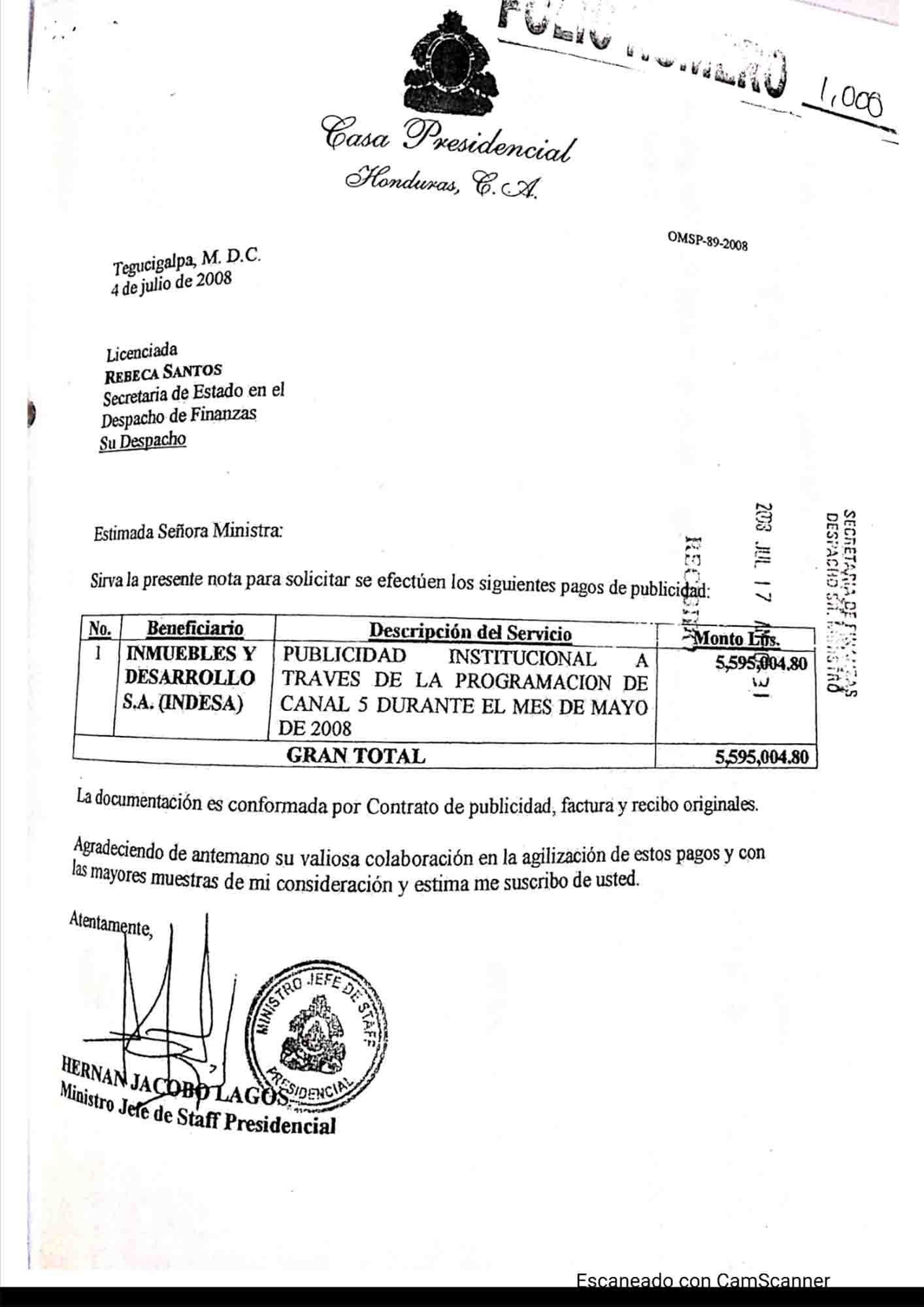The creation of the General Department of Information and Press by executive decree of the Xiomara Castro government has raised concerns about threats to the freedom of the press in Honduras. Minister for Strategic Planning, Ricardo Salgado denied to Contracorriente that it marks the beginning of dictatorial control of information in Honduras an,d joined many in the government in saying that criticism of this law is part of a campaign to destabilize the Castro government.
Text: Leonardo Aguilar
Photos: Jorge Cabrera and Fernando Destephen
Translated by Ann Deslandes
On September 19, the Xiomara Castro government created, through executive decree PCM 023-2022, the General Department of Information and Press. The Department will be part of the Ministry of Strategic Planning, with its head to be appointed by the President of the Republic.
Through the Department, information and communication produced by government bodies and agencies in communication and social networks are to be centrally coordinated, and the decree stipulates “permanent” monitoring and analysis of all conventional and alternative media, including social networks. According to the decree, the Department of Information and Press, “may carry out or contract measurement, surveys, opinion studies or other necessary technical means” to achieve this.
The decree also mandates “daily monitoring and analysis of the news that refers to the actions of the Government of the Republic, disseminated in the national and international, conventional or alternative media.” Further, it stipulates that the national telecommunications authority (Comisión Nacional de Telecomunicaciones — CONATEL) create and oversee an “inventory of radio stations, television stations, print, and digital periodicals, as well as all the content that is handled in social networks.” The Minister of Strategic Planning, Ricardo Salgado, also announced that contracting for media advertising would be standardized.
On October 12, the Committee for Free Expression (El Comité por la Libre Expresión, C-LIBRE) issued a statement on its website and social networks saying that the General Department has at least four features that indicate harm to freedom of expression and restriction of a free press. These are the concentration of public discourse by the state; placing conditions on advertising; prior censorship of press content by the government, and, excessive powers being granted to the telecommunications authority (CONATEL).
Two days after C-LIBRE published its statement, its board of directors (Arnaldo Rodríguez, Gilda Silvestrucci, Eleana Borjas, José López, Jesús Carcamo and German Aragón) issued a public clarification that the statement did not reflect the opinion of the board of directors.
On Saturday, October 15, C-LIBRE executive director Amada Ponce said that the clarification “was a decision of the Board of Directors. It was not my decision, nor that of the technical team, with whom it was not discussed”.
Ponce, who also leads the C-LIBRE technical team, noted that several of the Board of Directors have been activists with Libertad y Refundación (LIBRE), the current ruling party in Honduras.
Gilda Silvestrucci, for example, was LIBRE congressman Jari Dixon’s alternate deputy during the 2014-2018 electoral period, while in the last internal elections, Silvestrucci ran to be a LIBRE deputy.
In an interview with Contracorriente on October 13, Amada Ponce referred to the position published by C-LIBRE after the General Department decree was issued.
Ponce said that the Government is facing a decline in President Xiomara Castro’s public image, evidenced, for example, in that she has ceased public appearances. Since Castro took office, said Ponce, the President has made only two appearances to the press at Government House, and reporters have not been allowed to ask questions.
Ponce stated that the most alarming aspect of the decree is the concentration of all information produced by the Government at the executive level, including information generated in other branches of the State or in institutions that are autonomous and decentralized from the State.
Ponce said the decree refers to “concentrating information produced in all the organs and dependencies of the State … not only the Executive Branch, but also information that comes from the municipalities, decentralized entities, the National Congress, the Supreme Court, and the Police Ministry, among others.”
The executive director of C-LIBRE added that CONATEL will not only be able to exercise power within its traditional mandate of radio and television channels but, through the new Department, the telecommunications authority will now oversee “printed, digital media and social networks,” which are not within its expertise.
Minister of Strategic Planning Ricardo Salgado told Contracorriente that the objective of the decree is to “reorganize” communications by the Government to citizens.
The Minister added that this reorganization will be based on analyses and monitoring of the media, including activity on social media.
Although it is an executive decree, some deputies have reacted with concern. Among them, lawyer Maribel Espinoza, National Congress member for the Partido Salvador de Honduras (PSH), told Contracorriente that the Ministry of Strategic Planning should not lead the Department of Information and Press.
Espinoza said that, under Honduran public administration law, the Ministry of Strategic Planning was not supposed to “monitor… conventional or alternative media.”
Vice President Salvador Nasralla set himself apart from the decision taken by his government and stated on his Twitter account that the creation of this Department is the “beginning of a new dictatorship to restrict freedom of expression”.
Nasralla’s position caused a rupture within President Xiomara Castro’s government. On Friday, October 14, Mel Zelaya said that the alliance between LIBRE and PSH is broken.
Speaking on Channel 8, Zelaya stated that the alliance with Nasralla was broken “from the moment he insulted the President.”
“He insults [us all] and the LIBRE party… he belittles everything that is being done for the people.”
Contracorriente asked Minister Ricardo Salgado whether the decree marks the beginning of a dictatorship and absolute control of information in Honduras. He denied it, affirming that a destabilization campaign against Xiomara Castro’s government is underway.
At the same time, the Minister acknowledged that it is necessary [the government] changes strategy, as, within the media “nobody recognizes” the work being carried out by the new Government.
“There has been a destabilization campaign that is fundamentally seeking to prevent the Government from moving forward,” he said.
“I will give you an example: more than half of the Cabinet is all over the country helping people right now, handling the emergency [flooding due to intense rain], but it is not in any media.”
“All that is in the media is nonsense, the madness of any fool, statements [in the media] that there are new dictatorships”.
“If we were a dictatorship they would not be saying all … the lies they say every day.”
Minister Salgado further said that it was ‘natural’ to assign the new duties to CONATEL.
“We have to know what channels exist, if they are legal, and in what scope they operate.”
“Ninety-eight percent of all the media outlets in the country are private, we need to know what they are and where they are”.
Regarding concerns about the Department concentrating public discourse, the Minister responded that “everyone will be able to continue saying whatever they want.”
“What this is about is the Government having a global strategy in how it communicates.”
Amada Ponce said she is concerned about what the Government will do with the information that results from the planned analysis and monitoring of the media, “because we do not know exactly what meaning they are going to give” to that information — especially as the decree “extends not only to the media but also to [social media] networks”.
Salgado said that, as a government, they have an “obligation to monitor social media networks” because “we believe that it is one of the sources where young people express themselves the most and we have to see what they are saying”.
The Minister added that the Government will be addressing two types of information management and analysis through the General Department: “one is the information that the Government transfers to the people and the other is how the people and the media are handling the information we have.”
The Zelaya family and their connections to media companies
From the beginning of her government, President Xiomara Castro surrounded herself with her children and her husband. Her eldest son, Héctor Manuel Zelaya, is the president’s private secretary and is consistently seen representing his mother in high-level meetings and her youngest son, José Manuel Zelaya, calls himself an ad honorem advisor to the presidency. Castro’s husband José Manuel Zelaya Rosales, the former president, is the most high-profile presidential advisor. Further, several of the presidential couple’s children have had experience in the media and are directly linked to digital communication and media monitoring companies.
In September 2020, José Manuel Zelaya created the company Smart Digital, whose purpose includes the management of media, social networks, content creation, marketing and sale of advertising space. José Manuel’s wife also opened a digital media company, originally named Notibomba and now Smart Digital Corp. Her husband is also now a partner in Smart Digital Corp.
Zoe Zelaya, the president’s eldest daughter, and youngest daughter Xiomara Hortensia Zelaya, who is also a congresswoman, opened a communication consulting company, Smart Communication Corp, in June 2019. The company’s services include communication plans, online reputation management, network and media monitoring; it also does qualitative and quantitative positioning surveys, political intelligence and several other media services such as magazine printing or production of public events.
These companies do not appear as State contractors in the government’s procurement registry (ONCAE – Oficina Normativa de Contratación y Adquisiciones del Estado de Honduras/Procurement Regulatory Office of the State of Honduras).
What will the information being coordinated and analyzed by the Deparment be used for?
Minister Salgado said that the planned media surveying, monitoring and analysis will be used to establish advertising possibilities [for the government].
Where media outlets sell advertising space to clients based for example on audience analytics, “we will do the same,” the Minister explained.
Instead of paying for audience analytics, the Government will undertake it directly, “with the people [of Honduras], asking them which channel they consume the most or which program they watch at 7 o’clock at night.”
For Amada Ponce, the concern remains that, if the planned monitoring by the General Department of Information and Press is used to develop an advertising schedule for the government as this can be instrumentalized for its own purposes.
This is not the first time that the Castro government has encountered controversy on issues related to advertising, propaganda and the media.
In May of this year the Government launched the first edition of the government newspaper Poder Popular (Popular Power) at an estimated production cost, for that month, of HNL 1,559,340.00 (USD 63,471.25).
The Honduran Press Secretary, Ivis Alvarado, assured Contracorriente at the time that with the creation of the newspaper – with a weekly circulation of 20,000 copies -, million-dollar contracts to private outlets for advertising services would be “a thing of the past” especially as the newspaper would join the National Radio of Honduras (Radion Nacional de Honduras, RNH) and the National Television of Honduras (Television Nacional de Honduras, TNH).
Amilcar Valdés, assistant manager of the National Graphic Arts Company (Empresa Nacional de Artes Gráficas – ENAG), which prints Poder Popular, said that the final step before printing the newspaper is the approval of presidential advisor Manuel Zelaya.
“Once the newspaper is corrected, President Zelaya reviews it and, as he is very methodical, he sends it back for review if he makes some changes.”
Speaking on Radio América this month, LIBRE leader Gilberto Ríos said the party is looking favorably on advertising with private media.
“If we run an advertisement through Poder Popular, [state outlets] Channel 8 or Radio Nacional, not even 3% of the population will listen to it. The bulk of the audience is in the private media, it is necessary to advertise in order to reach the masses”, said Ríos.
In past years, former President Mel Zelaya was investigated for abusing public funds to pay media outlets, journalists and polling companies. Indeed, months before his ‘fourth ballot box’ referendum in 2009, Mel Zelaya’s government paid huge amounts of money to journalists Eduardo Maldonado and Esdras Amado López. Former President Hernández was also been questioned over a payment of 52 million lempiras from his administration to a media outlet.
The report The Return of the Zelaya Clan, published by Contracorriente and Redacción Regional showed irregularities in a government audit for the period July 2008 to February 28, 2010. The audit found that media advertising was contracted directly for an amount of twenty million lempiras (USD 1,051,524.71). The agreement that made this possible was signed by former President Mel Zelaya and Aristides Mejia Carranza, then Secretary of State in the Office of National Defense.
Regarding advertising, Minister Salgado said that his Ministry will make proposals according to the media studies carried out by the new Department to determine “which spaces it is convenient” to advertise in so that the President of the Republic may decide “which are the steps to be taken.”
Salgado added that the Department will also manage contracting, payment for advertising spots, and reporting on the contracts via the government’s transparency portal.
C-LIBRE has noted that, in the midst of all this controversy, Honduran journalists continue to be victims of attacks by a constellation of organized crime, drug trafficking and extractive companies. C-LIBRE this year has issued alerts on the safety of journalists that are no less serious than in previous years.
“Last year we only registered one murder, this year we have five,” said Amada Ponce.
Is a new coup d'état in the making?
On October 13, President Xiomara Castro met with her husband and advisor Manuel Zelaya Rosales in the Presidential House, as well as with a number of LIBRE deputies.
That same day, several government officials and activists posted on their social networks that a coup d’état is brewing in Honduras and that a process of “destabilization” is being undertaken against the government of Xiomara Castro.
Salgado told Contracorriente that coups d’état are only possible “if the United States agrees. There is no coup d’état in any part of the world without the participation of the United States, we must be clear about that”, he said.
“This is my personal opinion, it is not a government position on the matter,” he said, adding “I would point out that the United States seeks … destabilization, to convince the people that the Government is wrong….”
Dr. Edmundo Orellana Mercado, head of the Secretariat of Transparency and Fight Against Corruption (Secretaría de Transparencia y Lucha Contra la Corrupción – STLCC) and expert in administrative law, said in an interview on the television program Frente a Frente that the creation of the General Department of Information and Press seems unnecessary, as it is to execute administrative tasks that are otherwise realized via a simple order from President Xiomara Castro to the Minister of Press.
“There was no need to issue a PCM [executive decree],” said Orellana.
“Unfortunately, there are people here who believe that if things are not said at a certain level or implemented in norms which have almost the force of law then they don’t work,” said Orellana.
Amada Ponce stated that, in the midst of all this discussion about the media, the State continues to present limitations to freedom of expression. Citing criminal violence around mining sites, reform to special development zones and censorship laws, she said “this has not changed at all.”
Read also: Despite new Honduran government, big business is still destroying the environment
Amada added that the dynamics threatening freedom of expression are connected throughout Central America. In her opinion, transnational corporations operate in Central America with the same corrupt practices and the same political interests of the presidents of Honduras, Guatemala, El Salvador and Nicaragua.
She said the greatest concern is for Nicaragua, where “dozens, if not hundreds of journalists and leaders of critical voices have had to leave the country and cannot continue living under such an absolute regime.”

